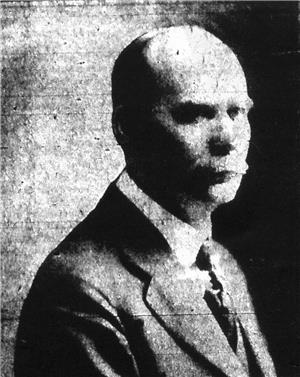On Sunday, October 17, 1920, Vancouver mayor G. R. Percival (1860-1920) disappears after a stroll through the city and across the Interstate Bridge over the Columbia River. A frantic search follows. The river is searched numerous times, but nothing is found; it's as if he vanished into thin air. His body will be found more than a month later hanging from a tree in dense woods on Hayden Island, located in the river between Vancouver and Portland. In an unlikely coda, he becomes known as the Interstate Bridge Ghost.
Poor health
Grover Reed Percival was born in Ohio on February 18, 1860, and practiced law there as a young man. He married Elva Hall in 1886 and they had two children: Ralph (1887-1965) and Donald. The family moved to Vancouver (Clark County) in 1902, where Percival continued to practice law. His son Ralph later joined his practice.
Percival was on Vancouver's city council from 1914 to 1917, where he established himself by bringing business to the city. He quickly gained the respect of other council members, and when Vancouver's mayor resigned in November 1917 to take a job in Oregon, the council unanimously elected Percival to replace him. He won election in his own right in December 1918 by a nearly 2-to-1 margin over his opponent.
Percival faced more opposition in the 1920 mayoral election, particularly from J. P. Kiggins (1869-1941), a popular former mayor of Vancouver. But by the autumn of 1920 Percival was facing what newspapers of the day described as "not in good health" or "poor health." In 1920, this was a catch-all phrase that could mean most anything. However, he did not announce that he would not seek reelection until early in October, less than two weeks before his disappearance. His term was to expire in January.
Vanished
It was drizzling and cool in Vancouver on Sunday morning, October 17, when Percival told his wife he was going for a long walk. He had a habit of taking such walks, so little was thought of it until he failed to return home that evening. By the middle of the next day, it seemed as if half of the city was looking for him. Downtown businesses closed at 1 p.m., and more than 300 men combed Vancouver from the Columbia River to well north and west of the city. Witnesses reported having seen Percival at several locations in Vancouver on Sunday, and several more witnesses said they had seen him on the Interstate Bridge walking toward Portland -- but he was subsequently seen returning to Vancouver, and he was seen in the city afterward.
Nevertheless, there was much concern that Percival might have drowned in the river. Over the next four days it was dragged three times in a search for his body. As the days went on with no findings, the focus of the search began to shift. It was commonly known that Percival was stressed from his job and was upset by a wrongful-death claim that had been brought against the city. Some hoped that he had boarded a train or simply walked off, not fully knowing what he was doing, and perhaps was an unidentified guest or patient somewhere. Circulars were distributed along much of the West Coast as far south as California, and both of Percival's sons tracked down various leads that the family received. There were numerous "sightings." All were dead ends.
Nearly a month after his disappearance, Ralph Percival's wife, Gladys, gave an interview to The Seattle Times which shed light on the circumstances leading up to Percival's disappearance. She said the family believed the stress of the mayor's job "broke him mentally" and that he had taken "very much to heart" ("Coast Wide Hunt") the wrongful-death claim filed against the city. He was said to have slept very little for three weeks prior to his disappearance.
Ghostly sightings
On Monday afternoon, November 22, a Portland resident, O. F. Williams, discovered Percival's body hanging from a tree in a wooded area on the northern end of Hayden Island about 100 yards from the approach to the Spokane, Portland, and Seattle railroad bridge (also identified as the North Bank bridge). Despite having been exposed to the elements for more than five weeks, the body was quickly identified. Percival's watch, signet ring, and various papers were still on his body, though The Oregonian observed that he "left no note of farewell to his wife and family" ("Mayor Percival").
After he was last seen in Vancouver on October 17, it appeared that Percival had again crossed the Interstate Bridge to the island and walked nearly a mile west to the woods near the railroad bridge. There he climbed onto a tree root, tied one end of a handkerchief around his neck and the other to a branch, and stepped from the root. There was no inquest, as there was no evidence of foul play.
The story has since taken on a life of its own. Over the years there have been what are claimed to be sightings of an apparition of a man walking on the old Interstate Bridge (a second one next to it was completed in 1958) on some autumn nights. The descriptions match Percival's generally, though the ghost is said to be tall, while Percival was just 5 feet 9. The figure appears to be solid, but then seems to vanish into thin air, a spectral presence that has become known the Interstate Bridge Ghost.

